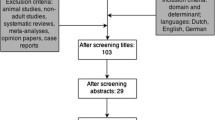Abstract
The role of early versus late initiation of total parenteral nutrition in critically ill patients is a topic of debate among nutrition experts. The European Society of Parenteral and Enteral Nutrition (ESPEN) recommends that all patients who are not expected to be on normal nutrition within 3 days of ICU admission should receive parenteral nutrition (PN) within 24–48 h if enteral nutrition (EN) is contraindicated or if they cannot tolerate EN. The American Society of Parenteral and Enteral Nutrition (ASPEN) guidelines recommend that if early EN is not feasible or available the first 7 days following admission to the ICU, no supplemental PN support therapy should be provided. Since the release of these guidelines, several large multi-center trials have been published that may alter the previously published recommendations. With the anticipated release of the new ASPEN guidelines, a number of recent studies will not be evaluated since the cut-off for the inclusion of new studies was December 31, 2013. The current article reviews both the ESPEN and ASPEN guidelines for the recommendation of PN support in critically ill adult patients and reviews large multi-center studies that were performed since these guidelines were published.
Similar content being viewed by others
References
Papers of particular interest, published recently, have been highlighted as: • Of importance •• Of major importance
•• Singer P, Berger MM, Van den Berghe G, Biolo G, Calder P, Forbes A, et al. ESPEN Guidelines on Parenteral Nutrition: intensive care. Clin Nutr. 2009;28(4):387–400. Most recent practice guidelines for the use of parenteral nutrition in critically ill patients.
•• Peev MP, Yeh DD, Quraishi SA, Osler P, Chang Y, Gillis E, et al. Causes and consequences of interrupted enteral nutrition: a prospective observational study in critically ill surgical patients. JPEN J Parenter Enteral Nutr. 2015;39(1):21–7. Most recent guideline from ASPEN regarding the use of EN and PN in critically ill patients.
Dey R, Bhattacharyya M, Todi S. Impact of cumulative calorie and protein deficits in critically ill patients. Crit Care. 2011;15(Suppl 1):P382.
De Waele E, De Bondt K, Czapla J, Nijs J, Nguyen D, Honoré PM, et al. A nutritional protocol and personalized support reduce the cumulative caloric deficit of cardiac surgery patients. Crit Care. 2014;18(Suppl 1):P427.
McClave SA, Martindale RG, Vanek VW, McCarthy M, Roberts P, Taylor B, et al. Guidelines for the provision and assessment of nutrition support therapy in the adult critically ill patient: Society of Critical Care Medicine (SCCM) and American Society for Parenteral and Enteral Nutrition (A.S.P.E.N.). J Parenter Enteral Nutr. 2009;33(3):277–316.
Sandstrom R, Drott C, Hyltander A, Arfvidsson B, Schersten T, Wickstrom I, et al. The effect of postoperative intravenous feeding (TPN) on outcome following major surgery evaluated in a randomized study. Ann Surg. 1993;217(2):185–95.
Giner M, Laviano A, Meguid MM, Gleason JR. In 1995 a correlation between malnutrition and poor outcome in critically ill patients still exists. Nutrition. 1996;12(1):23–9.
• Villet S, Chiolero RL, Bollmann MD, Revelly JP, Cayeux RNM, Delarue J, et al. Negative impact of hypocaloric feeding and energy balance on clinical outcome in ICU patients. Clin Nutr. 2005;24(4):502–9. Study evaluating the cumulative calorie deficit and associated ICU outcomes.
• Heyland DK, MacDonald S, Keefe L, Drover JW. Total parenteral nutrition in the critically ill patient: a meta-analysis. Jama. 1998;280(23):2013–9. A well known meta-analysis on the outcomes of ICU patients receiving TPN.
Braunschweig CL, Levy P, Sheean PM, Wang X. Enteral compared with parenteral nutrition: a meta-analysis. Am J Clin Nutr. 2001;74(4):534–42.
Casaer MP, Mesotten D, Hermans G, Wouters PJ, Schetz M, Meyfroidt G, et al. Early versus late parenteral nutrition in critically ill adults. N Engl J Med. 2011;365(6):506–17.
McClave SA, Heyland DK, Martindale RG. Adding supplemental parenteral nutrition to hypocaloric enteral nutrition: lessons learned from the Casaer Van den Berghe study. J Parenter Enteral Nutr. 2012;36(1):15–7.
van den Berghe G, Wouters P, Weekers F, Verwaest C, Bruyninckx F, Schetz M, et al. Intensive insulin therapy in critically ill patients. N Engl J Med. 2001;345(19):1359–67.
Finfer S, Chittock DR, Su SY, Blair D, Foster D, Dhingra V, et al. Intensive versus conventional glucose control in critically ill patients. N Engl J Med. 2009;360(13):1283–97.
• Casaer MP, Wilmer A, Hermans G, Wouters PJ, Mesotten D, Van den Berghe G. Role of disease and macronutrient dose in the randomized controlled EPaNIC trial: a post hoc analysis. Am J Respir Crit Care Med. 2013;187(3):247–55. Post-hoc analysis of the EPaNIC study, which is the largest prospective nutrition study to date.
Fivez T, Kerklaan D, Verbruggen S, Vanhorebeek I, Verstraete S, Tibboel D, et al. Impact of withholding early parenteral nutrition completing enteral nutrition in pediatric critically ill patients (PEPaNIC trial): study protocol for a randomized controlled trial. Trials. 2015;16(1):202.
•• Harvey SE, Parrott F, Harrison DA, Bear DE, Segaran E, Beale R, et al. Trial of the route of early nutritional support in critically ill adults. N Engl J Med. 2014;371(18):1673–84. Large multi-center European study comparing TPN and EN head-to-head.
Edakkanambeth Varayil J, Whitaker JA, Okano A, Carnell JJ, Davidson JB, Enzler MJ, et al. Catheter salvage after Catheter-related bloodstream infection during home parenteral nutrition. JPEN J Parenter Enteral Nutr. 2015. doi:10.1177/0148607115587018.
Cereda E, Caccialanza R. Trial of the route of early nutritional support in critically ill adults. N Engl J Med. 2015;372(5):487.
Ramamurthy M. Trial of the route of early nutritional support in critically ill adults. N Engl J Med. 2015;372(5):488.
Author information
Authors and Affiliations
Corresponding author
Additional information
This article is part of the Topical Collection on Nutrition, Metabolism, and Surgery.
Rights and permissions
About this article
Cite this article
Edakkanambeth Varayil, J., Mundi, M.S. & Hurt, R.T. The Current Role of Parenteral Nutrition in the Hospitalized Patient. Curr Surg Rep 3, 23 (2015). https://doi.org/10.1007/s40137-015-0102-5
Published:
DOI: https://doi.org/10.1007/s40137-015-0102-5



